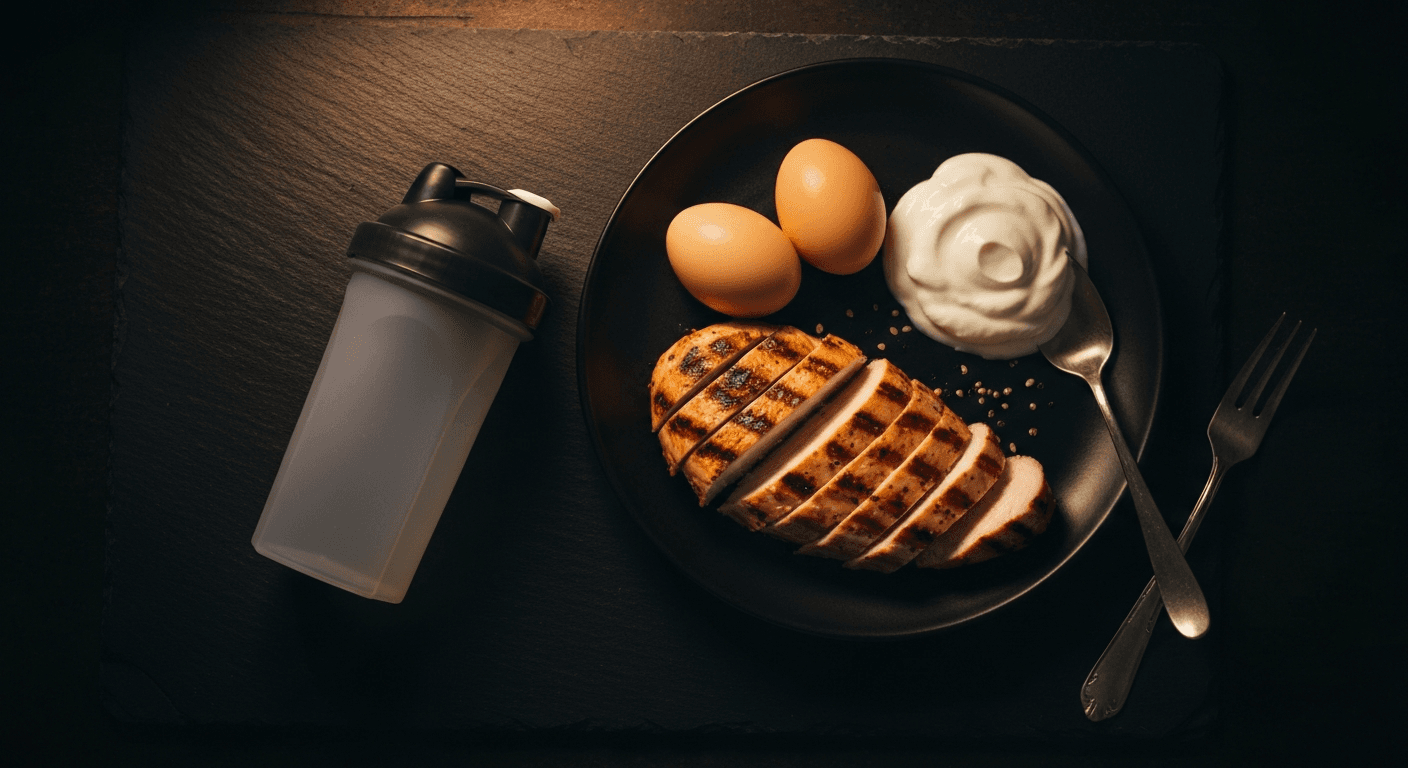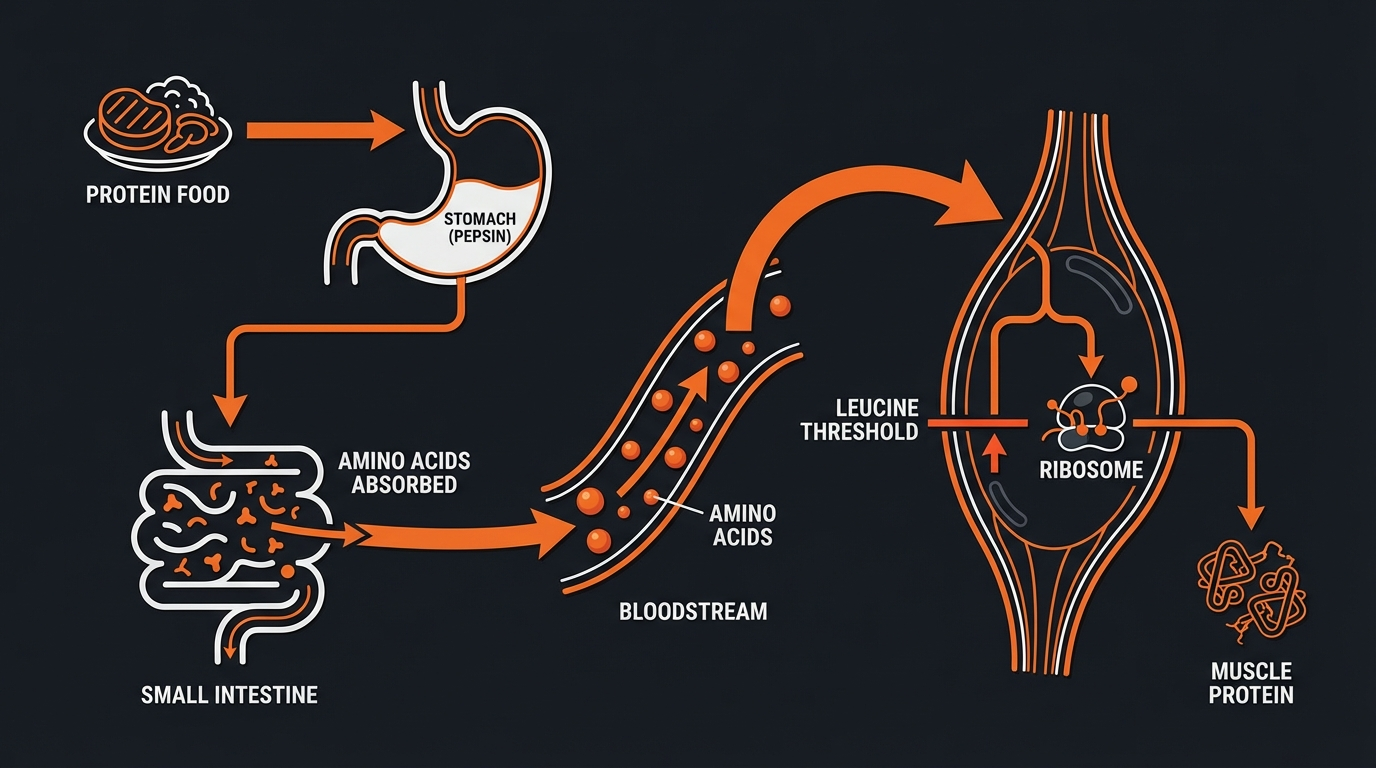Pea Protein vs. Soy Protein: Which Plant-Based Option is Superior?
As the popularity of plant-based diets continues to rise, two protein sources have emerged as front-runners: pea protein and soy protein. For many health-conscious consumers, the question is, which plant-based option is superior?

Key Takeaways
- Pea protein works just as well as whey for building muscle but has less methionine, so pair it with rice protein to get all your amino acids.
- Soy protein is a complete protein with all nine essential amino acids and can lower your cholesterol if you eat 25 grams daily.
- If you have food allergies or a sensitive stomach, go with pea protein since it's hypoallergenic and easier to digest.
- Soy protein contains phytoestrogens that might mess with your hormones, so avoid it if you have thyroid issues.
- Both proteins pack around 80-90 grams of protein per 100 grams, so you can't really go wrong with either one for hitting your macros.
Get a Free AI Coach on WhatsApp
Ask questions, get workout plans, and track your progress — all from WhatsApp.
Message Your CoachIn this article, we delve into the nutritional profiles, benefits, and potential drawbacks of both to help you make an informed decision.
Nutritional Profiles of Pea Protein and Soy Protein
When comparing pea protein and soy protein, it's crucial to understand their nutritional compositions:
Pea Protein
Derived from yellow split peas, pea protein is rich in essential amino acids, particularly branched-chain amino acids (BCAAs) like leucine, isoleucine, and valine (source). It is also high in iron and low in fat, making it an excellent choice for those looking to increase muscle mass and maintain a lean physique (source).
Soy Protein
Extracted from soybeans, soy protein is considered a complete protein, meaning it contains all nine essential amino acids (source). Additionally, soy protein is high in glutamine and arginine, amino acids that support muscle growth and immune function (source).
Both proteins have their unique advantages, but the choice depends on your specific nutritional needs and goals.

Health Benefits
Both pea and soy proteins offer a range of health benefits:
Pea Protein
- •Heart Health: High in arginine and BCAAs, pea protein supports cardiovascular health by improving blood flow and reducing hypertension (source).
- •Muscle Growth: A study published in the Journal of the International Society of Sports Nutrition found that pea protein was just as effective as whey protein in promoting muscle thickness after resistance training (source).
- •Digestive Health: Pea protein is hypoallergenic and easily digestible, making it a suitable option for individuals with food allergies or sensitivities (source).
Soy Protein
- •Bone Health: Rich in isoflavones, soy protein helps enhance bone mineral density, reducing the risk of osteoporosis (source).
- •Lower Cholesterol: The FDA recognises that consuming 25 grams of soy protein daily can reduce LDL cholesterol levels, promoting overall heart health (source).
- •Hormonal Balance: Soy protein contains phytoestrogens, which can help balance hormone levels in both men and women (source).
Common Concerns
While both proteins have many benefits, they also come with a few concerns:
Pea Protein
One of the primary concerns about pea protein is its incomplete amino acid profile. While it is high in BCAAs, it is lower in methionine (source). However, this can be easily mitigated by combining pea protein with other protein sources like rice protein (source).
Soy Protein
Soy protein often faces scrutiny due to its phytoestrogen content, which can mimic oestrogen in the body. Some worry that this may affect hormone levels, but research shows that moderate consumption is generally safe for most people (source). Nevertheless, those with thyroid conditions should consult a healthcare professional before using soy protein (source).
Comparison of Pea and Soy Protein
| Nutrient (per 100g) | Pea Protein | Soy Protein |
|---|---|---|
| Protein | 80g | 90g |
| Fat | 7g | 4g |
| Carbohydrates | 3g | 0g |
| Fibre | 6g | 0g |
| Iron | 30% DV | 30% DV |
| Calcium | 4% DV | 6% DV |
| Leucine | 8.5g | 7.8g |
| Methionine | 1.0g | 1.3g |
| Phytoestrogens | None | Present |
*DV = Daily Value*
As seen in the table above, both pea and soy protein offer high amounts of protein per serving, with soy slightly edging out pea. Pea protein contains more fat, carbohydrates, and fibre, while soy protein has a slight advantage in calcium and methionine content. Notably, soy protein contains phytoestrogens, which are absent in pea protein.
Making the Right Choice for You
When deciding between pea and soy protein, consider the following practical tips:
- •Check for Allergies: If you have a soy allergy or experience digestive issues, pea protein is the better choice (source).
- •Evaluate Nutritional Goals: For muscle-building and a complete amino acid profile, incorporate both proteins into your diet (source).
- •Health Conditions: If you have hormonal imbalances or thyroid issues, limit your soy protein intake and consult your doctor (source).
Conclusion
In the debate of pea protein vs. soy protein, the answer ultimately lies in your individual needs and preferences. Both proteins offer unique benefits and can play a vital role in a balanced diet. For those seeking a hypoallergenic, easily digestible option, pea protein is ideal. Conversely, soy protein's complete amino acid profile and additional health benefits make it a robust choice for many. Consider your health conditions, dietary goals, and personal experiences to make the best choice for you.
Frequently Asked Questions
- Is pea protein or soy protein better for building muscle?
- They're very close, but soy has the edge with a complete amino acid profile similar to whey. Pea protein is slightly lower in methionine but higher in BCAAs. In practice, the difference is minimal if you're eating a varied diet alongside your shakes.
- Does soy protein lower testosterone in men?
- No. This myth has been thoroughly debunked. Multiple meta-analyses show that soy protein does not affect testosterone or estrogen levels in men at normal supplementation doses. You'd have to eat absurd amounts for any hormonal effect.
- Which plant protein tastes better, pea or soy?
- Most people find pea protein slightly more palatable with a milder, less beany flavor. Soy protein can have a chalky, earthy taste that's harder to mask. Both benefit from blending with fruit, cocoa powder, or nut butter.
- How much plant protein should I take per day?
- Same as any other protein source: enough to hit 0.7-1g per pound of bodyweight total daily protein. Since plant proteins are slightly less bioavailable than animal sources, some people bump their intake up by 10-15% to compensate.